Short biographies of attendees
|
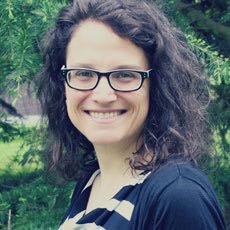 Laurence
Lessard-Phillips is a Research Fellow at the
Institute for Research into Superdiversity, University of
Birmingham. She previously worked at the University of
Manchester and the Netherlands Interdisciplinary
Demographic Institute. Her research interests include the
perceptions, measurement, and dimensionality of immigrant
adaptation; ethnic inequalities in education and the
labour market; the use of agent-based models related to
immigration and diversity; the transnational behaviour
across immigrant generations; and social inequalities and
social mobility. She is currently leading an ESRC-funded
research project investigating the role of family capital
on socio-economic and civic-political inclusion in Canada
and Britain. Website: Institute
for Research into Superdiversity Laurence
Lessard-Phillips is a Research Fellow at the
Institute for Research into Superdiversity, University of
Birmingham. She previously worked at the University of
Manchester and the Netherlands Interdisciplinary
Demographic Institute. Her research interests include the
perceptions, measurement, and dimensionality of immigrant
adaptation; ethnic inequalities in education and the
labour market; the use of agent-based models related to
immigration and diversity; the transnational behaviour
across immigrant generations; and social inequalities and
social mobility. She is currently leading an ESRC-funded
research project investigating the role of family capital
on socio-economic and civic-political inclusion in Canada
and Britain. Website: Institute
for Research into Superdiversity |
|
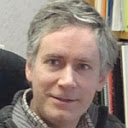 Bruce Edmonds is Professor
of Social Simulation and Director of the Centre for Policy
Modelling, which has a world-leading reputation in the
field of social simulation. His research covers all
aspects of how to use computer simulation in order to help
understand social phenomena, especially in complex
situations and on policy-relevant issues. He co-edited the
first handbook in the field (Edmonds & Meyer 2013) for
which a second edition is already scheduled. He instigated
and designed the £2.7M UK project on the “Social
Complexity of Immigration and Diversity” (SCID). Centre
for Policy Modelling website: http://cfpm.org Bruce Edmonds is Professor
of Social Simulation and Director of the Centre for Policy
Modelling, which has a world-leading reputation in the
field of social simulation. His research covers all
aspects of how to use computer simulation in order to help
understand social phenomena, especially in complex
situations and on policy-relevant issues. He co-edited the
first handbook in the field (Edmonds & Meyer 2013) for
which a second edition is already scheduled. He instigated
and designed the £2.7M UK project on the “Social
Complexity of Immigration and Diversity” (SCID). Centre
for Policy Modelling website: http://cfpm.org |
|
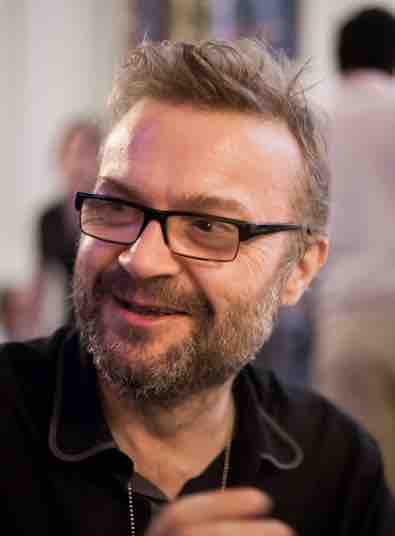 David Hales is a computer
scientist and visiting academic at the Centre for Policy
Modelling in Manchester. He has an interest in cultural
evolutionary processes related to groups, networks and
cooperation. A specific focus is the self-organising
characteristics of simple cultural markers (or tags) that
can be observed and imitated. Tag models have various
interpretations applied to them (including, for example,
ethnocentrism in the Hammond and Axelrod model). A more
general focus is how group properties emerge from
individual behaviour and individual behaviour is shaped
by, and perpetuates, group properties. Ideas in this realm
relate to conceptions of rationality, morality, agency and
evolution. Personal website: http://www.davidhales.com David Hales is a computer
scientist and visiting academic at the Centre for Policy
Modelling in Manchester. He has an interest in cultural
evolutionary processes related to groups, networks and
cooperation. A specific focus is the self-organising
characteristics of simple cultural markers (or tags) that
can be observed and imitated. Tag models have various
interpretations applied to them (including, for example,
ethnocentrism in the Hammond and Axelrod model). A more
general focus is how group properties emerge from
individual behaviour and individual behaviour is shaped
by, and perpetuates, group properties. Ideas in this realm
relate to conceptions of rationality, morality, agency and
evolution. Personal website: http://www.davidhales.com |
|
 Martin Neumann studied
Social Sciences, Mathematics, and Philosophy. He holds a
PhD in philosophy with a thesis on the history of
probability. After a post doc project about the
epistemology of social simulation he joined the project
EMIL on simulating norm innovation at the University of
Bayreuth. Subsequently he was assistant professor for
sociology at the RWTH Aachen University. There he worked
mainly on ethnic conflicts. Then he joined the project
GLODERS on the norm regulating extortion rackets and
organized crime at the University of Koblenz. Currently
research associate at the Jacobs University Bremen at a
project on opinion dynamics and collective decisions.
Webpage: https://www.jacobs-university.de/directory/maneumann Martin Neumann studied
Social Sciences, Mathematics, and Philosophy. He holds a
PhD in philosophy with a thesis on the history of
probability. After a post doc project about the
epistemology of social simulation he joined the project
EMIL on simulating norm innovation at the University of
Bayreuth. Subsequently he was assistant professor for
sociology at the RWTH Aachen University. There he worked
mainly on ethnic conflicts. Then he joined the project
GLODERS on the norm regulating extortion rackets and
organized crime at the University of Koblenz. Currently
research associate at the Jacobs University Bremen at a
project on opinion dynamics and collective decisions.
Webpage: https://www.jacobs-university.de/directory/maneumann |
|
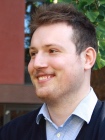 Thomas Feliciani is a
PhD student at the Sociology department of the University
of Groningen (the Netherlands). His research interests
include social influence, opinion polarization,
agent-based modeling, ethnic diversity, and radical-right. Thomas Feliciani is a
PhD student at the Sociology department of the University
of Groningen (the Netherlands). His research interests
include social influence, opinion polarization,
agent-based modeling, ethnic diversity, and radical-right.
|
|
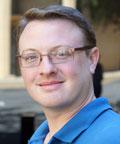 Matt Kasman is a research
associate at the Brookings Institution Center on Social
Dynamics and Policy. He received his undergraduate degree
in Computer Science from Boston University and, after
working for software startups that were sold to Microsoft,
Google, and Blackbaud, obtained a Masters in Politics and
Education from Columbia University. He received his
doctorate in Educational Policy at Stanford University in
2014. His dissertation explores how policy interacts with
geography and decision-making to generate patterns in
student enrollment over time in a large urban school
district. Through both his doctoral research and work at
Brookings he has gained extensive experience in applying
complex systems approaches to educational policy analysis,
public health topics, and biological systems. His current
research interests include childhood obesity prevention
efforts, food systems, literacy development, social
diffusion, school choice, affirmative action in higher
education, teacher labor markets, educational equity,
tobacco regulatory policy, and adaptive decision-making. Matt Kasman is a research
associate at the Brookings Institution Center on Social
Dynamics and Policy. He received his undergraduate degree
in Computer Science from Boston University and, after
working for software startups that were sold to Microsoft,
Google, and Blackbaud, obtained a Masters in Politics and
Education from Columbia University. He received his
doctorate in Educational Policy at Stanford University in
2014. His dissertation explores how policy interacts with
geography and decision-making to generate patterns in
student enrollment over time in a large urban school
district. Through both his doctoral research and work at
Brookings he has gained extensive experience in applying
complex systems approaches to educational policy analysis,
public health topics, and biological systems. His current
research interests include childhood obesity prevention
efforts, food systems, literacy development, social
diffusion, school choice, affirmative action in higher
education, teacher labor markets, educational equity,
tobacco regulatory policy, and adaptive decision-making. |
|
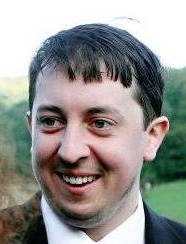 Thomas Loughran. Tom
Loughran is a Lecturer in Electoral Politics at the
University of Manchester. He completed a PhD
analysing the mechanisms through which individuals convert
their values into vote preferences in 2016 and was
previously research assistant on the SCID Project in the
Cathie Marsh Institute for Social Research at University
of Manchester. Thomas Loughran. Tom
Loughran is a Lecturer in Electoral Politics at the
University of Manchester. He completed a PhD
analysing the mechanisms through which individuals convert
their values into vote preferences in 2016 and was
previously research assistant on the SCID Project in the
Cathie Marsh Institute for Social Research at University
of Manchester.
|
|
 Huw Vasey is a Research
Associate in the Multilingual Manchester team in the
School of Arts, Languages and Cultures, and a member of
the Manchester Migration Lab, both at the University of
Manchester. He is a social anthropologist and human
geographer whose work has focused on international
migration and processes of adaptation and change
post-migration, including labour market integration,
inter-ethnic marriage and community diversity, and
language use and needs in super-diverse cities. This has
involved using methods ranging from ethnography to big
data analysis, via agent-based modelling. Huw also has an
interest in how complexity theory can be used in
developing social science methodologies and social theory.
He is currently working on the Multilingual Communities
strand of the AHRC funded Open
World Research Initiative. Information on previous
work is available at https://manchester.academia.edu/HuwVasey. Huw Vasey is a Research
Associate in the Multilingual Manchester team in the
School of Arts, Languages and Cultures, and a member of
the Manchester Migration Lab, both at the University of
Manchester. He is a social anthropologist and human
geographer whose work has focused on international
migration and processes of adaptation and change
post-migration, including labour market integration,
inter-ethnic marriage and community diversity, and
language use and needs in super-diverse cities. This has
involved using methods ranging from ethnography to big
data analysis, via agent-based modelling. Huw also has an
interest in how complexity theory can be used in
developing social science methodologies and social theory.
He is currently working on the Multilingual Communities
strand of the AHRC funded Open
World Research Initiative. Information on previous
work is available at https://manchester.academia.edu/HuwVasey.
|
|
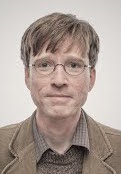 Fredrik Jansson is a
research fellow at the Centre for the Study of Cultural
Evolution at Stockholm University and a Senior Lecturer at
Mälardalen University. He holds degrees in Mathematics,
Computer Science and English Language, and has an interest
in the mathematical modelling of human behaviour, in
particular related to groups, and cultural evolution. The
models often incorporate empirical data and are tested
through surveys and experiments. Personal website: fredrik.name Fredrik Jansson is a
research fellow at the Centre for the Study of Cultural
Evolution at Stockholm University and a Senior Lecturer at
Mälardalen University. He holds degrees in Mathematics,
Computer Science and English Language, and has an interest
in the mathematical modelling of human behaviour, in
particular related to groups, and cultural evolution. The
models often incorporate empirical data and are tested
through surveys and experiments. Personal website: fredrik.name |
|
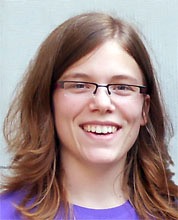 Linda Urselmans. My
current project involves modelling responses to migration.
I am interested in the interaction between migrants and
the citizens of the host countries. Building on my
previous paper, I am investigating whether positive or
negative feedback loops can cause levels of acceptance or
rejection of migrants to change. The model builds on
theories of social contact and conflict. Especially in the
wake of changing sentiments towards migrants in Europe, I
plan to validate the model against empirical data. In
general, my research focuses on complex adaptive systems
(such as social systems) with autonomous agents. I use
Agent-based modelling to approach social questions, but
not just in Political Science; I'm currently collaborating
on a project involving Chimpanzee grooming and how to
incorporate field work data in an Agent-Based model.
Personal webpage: http://lurselmans.me/ Linda Urselmans. My
current project involves modelling responses to migration.
I am interested in the interaction between migrants and
the citizens of the host countries. Building on my
previous paper, I am investigating whether positive or
negative feedback loops can cause levels of acceptance or
rejection of migrants to change. The model builds on
theories of social contact and conflict. Especially in the
wake of changing sentiments towards migrants in Europe, I
plan to validate the model against empirical data. In
general, my research focuses on complex adaptive systems
(such as social systems) with autonomous agents. I use
Agent-based modelling to approach social questions, but
not just in Political Science; I'm currently collaborating
on a project involving Chimpanzee grooming and how to
incorporate field work data in an Agent-Based model.
Personal webpage: http://lurselmans.me/
|
|
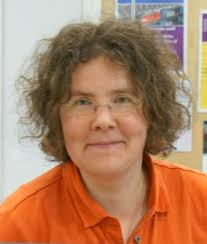 Ruth Meyer is a research
fellow at the Centre for Policy Modelling, Manchester
Metropolitan University. Her research interests include
agent-based simulation, spatial modelling and simulation
methodologies in general. She has over ten years of
experience modelling complex social systems during her PhD
at Hamburg University and subsequently at the CPM. She
co-edited the handbook on “Simulating Social Complexity”
with Bruce Edmonds for Springer in 2013 and is currently
working on its second edition. Website: http://cfpm.org Ruth Meyer is a research
fellow at the Centre for Policy Modelling, Manchester
Metropolitan University. Her research interests include
agent-based simulation, spatial modelling and simulation
methodologies in general. She has over ten years of
experience modelling complex social systems during her PhD
at Hamburg University and subsequently at the CPM. She
co-edited the handbook on “Simulating Social Complexity”
with Bruce Edmonds for Springer in 2013 and is currently
working on its second edition. Website: http://cfpm.org
|
|
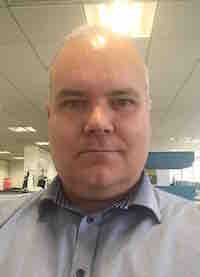 Cobus van Rooyen is a
PhD Researcher at Birkbeck, University of London and his
research concerns the studying of segregation patterns and
related dynamics of the City of Cape Town, through the use
of agent-based modelling and segregation metrics. His
background is in Urban Planning and Geographic Information
Science. He holds a Bachelor’s degree (1996-1999) in
Town & Regional Planning from the Cape Peninsula
University of Technology (formerly Cape Technikon) and a
Master's degree (2005-2006) in Geographic Information
Science from the University of London. He currently
functions as full-time GIS consultant in ADS&T
(Aerospace, Defence, Security and Technology) at Atkins
Global. Further interests involve the study of complex
adaptive systems and the concepts of urban emergence and
evolution. Personal website: http://www.complexsystemstheory.net Cobus van Rooyen is a
PhD Researcher at Birkbeck, University of London and his
research concerns the studying of segregation patterns and
related dynamics of the City of Cape Town, through the use
of agent-based modelling and segregation metrics. His
background is in Urban Planning and Geographic Information
Science. He holds a Bachelor’s degree (1996-1999) in
Town & Regional Planning from the Cape Peninsula
University of Technology (formerly Cape Technikon) and a
Master's degree (2005-2006) in Geographic Information
Science from the University of London. He currently
functions as full-time GIS consultant in ADS&T
(Aerospace, Defence, Security and Technology) at Atkins
Global. Further interests involve the study of complex
adaptive systems and the concepts of urban emergence and
evolution. Personal website: http://www.complexsystemstheory.net
|
|
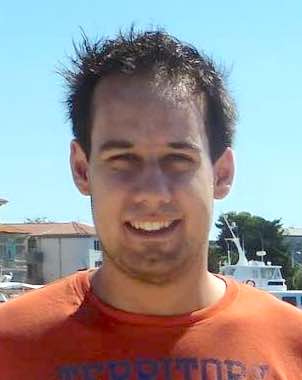 Benjamin Bonakdar is a PhD
student at the Ruhr-University Bochum in Germany and is
employed as research assistant at the Institute for
Macroeconomics, where the professorship is held by Prof.
Dr. Michael Roos. Benjamin’s research interests are in the
field of complexity and computational macroeconomics,
where the interaction of agents and the emergence of macro
patterns are of great relevance. For him,
interdisciplinary projects stand in focus, for which
reason he works on the issue of residential segregation in
urban areas in his PhD thesis in order to combine research
methods from economics and social science. He familiarized
himself with these methods during his Master’s program at
the University of Nuremberg in Germany, where he attained
theoretical knowledge in modern macro- and labor market
economics. First applications of these research methods
have been conducted in short time positions at the ifo
Institute (Munich) and at the Institute for Employment
Research (Nuremberg). In his Master’s Thesis he analyzed
the international spillover effects of the German Hartz
reforms in the European Union conducted in a computational
model. Website of the Institute for Macroeconomics,
Ruhr-University Bochum: http://www.ruhr-uni-bochum.de/mak/index.html.en Benjamin Bonakdar is a PhD
student at the Ruhr-University Bochum in Germany and is
employed as research assistant at the Institute for
Macroeconomics, where the professorship is held by Prof.
Dr. Michael Roos. Benjamin’s research interests are in the
field of complexity and computational macroeconomics,
where the interaction of agents and the emergence of macro
patterns are of great relevance. For him,
interdisciplinary projects stand in focus, for which
reason he works on the issue of residential segregation in
urban areas in his PhD thesis in order to combine research
methods from economics and social science. He familiarized
himself with these methods during his Master’s program at
the University of Nuremberg in Germany, where he attained
theoretical knowledge in modern macro- and labor market
economics. First applications of these research methods
have been conducted in short time positions at the ifo
Institute (Munich) and at the Institute for Employment
Research (Nuremberg). In his Master’s Thesis he analyzed
the international spillover effects of the German Hartz
reforms in the European Union conducted in a computational
model. Website of the Institute for Macroeconomics,
Ruhr-University Bochum: http://www.ruhr-uni-bochum.de/mak/index.html.en |
|
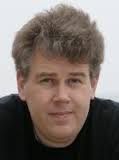 Edmund
Chattoe-Brown is lecturer in
Sociology at University of Leicester. His research deals
with decision-making in sociologically important contexts.
By contrast, he is also interested in evolutionary
theories of change in which practices are selected the
social environment rather than chosen by individuals. In
support of these interests, he has wide experience in
research methods, particularly computer simulation but
also qualitative research, social network analysis and
experiments. His theoretical and methodological interests
have developed in parallel with several empirical case
studies on household money management, secondhand markets,
adaptation of farming practices, ethnic disadvantage in
labour markets and social networks in criminal activity
and drug use. Webpage: http://www2.le.ac.uk/departments/sociology/people/echattoebrown Edmund
Chattoe-Brown is lecturer in
Sociology at University of Leicester. His research deals
with decision-making in sociologically important contexts.
By contrast, he is also interested in evolutionary
theories of change in which practices are selected the
social environment rather than chosen by individuals. In
support of these interests, he has wide experience in
research methods, particularly computer simulation but
also qualitative research, social network analysis and
experiments. His theoretical and methodological interests
have developed in parallel with several empirical case
studies on household money management, secondhand markets,
adaptation of farming practices, ethnic disadvantage in
labour markets and social networks in criminal activity
and drug use. Webpage: http://www2.le.ac.uk/departments/sociology/people/echattoebrown
|
|
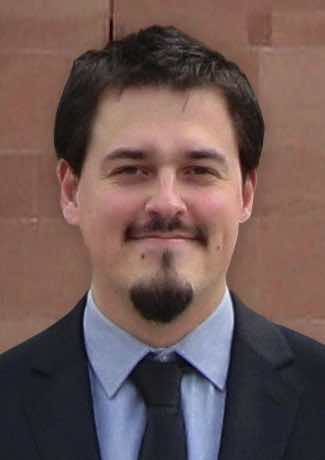 Pablo Lucas
is a Lecturer / Assistant Professor at the University
College Dublin, Ireland, with research focused on
computational social science, particularly experimental
design using agent-based models and data analysis.
Website: http://www.ucd.ie/research/people/sociology/drpablolucas/ Pablo Lucas
is a Lecturer / Assistant Professor at the University
College Dublin, Ireland, with research focused on
computational social science, particularly experimental
design using agent-based models and data analysis.
Website: http://www.ucd.ie/research/people/sociology/drpablolucas/
|
|
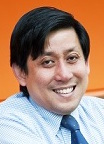 Bhakti Stephan
Onggo is an Assistant Professor in the Department of
Management Science at Lancaster University Management
School (LUMS). His research interests lie in the areas of
simulation modelling methodology (conceptual modelling,
agent-based simulation, discrete-event simulation, hybrid
simulation, symbiotic simulation) with applications in
operations and supply chain management (e.g. hospital,
manufacturing, transportation, warehouse) and social
science (e.g. social risk perception). Currently, he is
the Associate Editor for the Journal of Simulation.
Webpage: http://www.lancaster.ac.uk/staff/onggo Bhakti Stephan
Onggo is an Assistant Professor in the Department of
Management Science at Lancaster University Management
School (LUMS). His research interests lie in the areas of
simulation modelling methodology (conceptual modelling,
agent-based simulation, discrete-event simulation, hybrid
simulation, symbiotic simulation) with applications in
operations and supply chain management (e.g. hospital,
manufacturing, transportation, warehouse) and social
science (e.g. social risk perception). Currently, he is
the Associate Editor for the Journal of Simulation.
Webpage: http://www.lancaster.ac.uk/staff/onggo
|
|
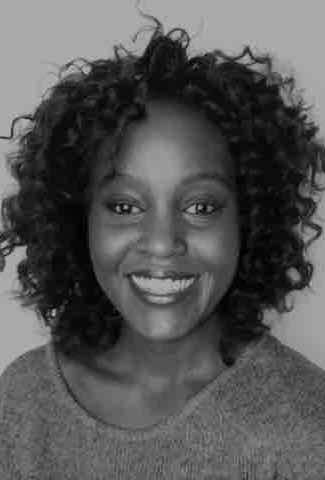 Linda Mutunga currently
works as a Decision and Market Consultant in EMEA market,
in addition to studying for a MSc at University of
Edinburgh in the area of Data Science with a particular
interest in Epistemics and Social Policy. Prior to this,
Linda worked in other blue chip companies, including the
BBC as a Producer and Reporter for BBC News, Sport and
Culture. As an entrepreneur, Linda was Nominated for an
Institute of Directors Award in 2015. Linda Mutunga currently
works as a Decision and Market Consultant in EMEA market,
in addition to studying for a MSc at University of
Edinburgh in the area of Data Science with a particular
interest in Epistemics and Social Policy. Prior to this,
Linda worked in other blue chip companies, including the
BBC as a Producer and Reporter for BBC News, Sport and
Culture. As an entrepreneur, Linda was Nominated for an
Institute of Directors Award in 2015.
|
|
 Laurence
Lessard-Phillips is a Research Fellow at the
Institute for Research into Superdiversity, University of
Birmingham. She previously worked at the University of
Manchester and the Netherlands Interdisciplinary
Demographic Institute. Her research interests include the
perceptions, measurement, and dimensionality of immigrant
adaptation; ethnic inequalities in education and the
labour market; the use of agent-based models related to
immigration and diversity; the transnational behaviour
across immigrant generations; and social inequalities and
social mobility. She is currently leading an ESRC-funded
research project investigating the role of family capital
on socio-economic and civic-political inclusion in Canada
and Britain. Website: Institute
for Research into Superdiversity
Laurence
Lessard-Phillips is a Research Fellow at the
Institute for Research into Superdiversity, University of
Birmingham. She previously worked at the University of
Manchester and the Netherlands Interdisciplinary
Demographic Institute. Her research interests include the
perceptions, measurement, and dimensionality of immigrant
adaptation; ethnic inequalities in education and the
labour market; the use of agent-based models related to
immigration and diversity; the transnational behaviour
across immigrant generations; and social inequalities and
social mobility. She is currently leading an ESRC-funded
research project investigating the role of family capital
on socio-economic and civic-political inclusion in Canada
and Britain. Website: Institute
for Research into Superdiversity  Bruce Edmonds is Professor
of Social Simulation and Director of the Centre for Policy
Modelling, which has a world-leading reputation in the
field of social simulation. His research covers all
aspects of how to use computer simulation in order to help
understand social phenomena, especially in complex
situations and on policy-relevant issues. He co-edited the
first handbook in the field (Edmonds & Meyer 2013) for
which a second edition is already scheduled. He instigated
and designed the £2.7M UK project on the “Social
Complexity of Immigration and Diversity” (SCID). Centre
for Policy Modelling website: http://cfpm.org
Bruce Edmonds is Professor
of Social Simulation and Director of the Centre for Policy
Modelling, which has a world-leading reputation in the
field of social simulation. His research covers all
aspects of how to use computer simulation in order to help
understand social phenomena, especially in complex
situations and on policy-relevant issues. He co-edited the
first handbook in the field (Edmonds & Meyer 2013) for
which a second edition is already scheduled. He instigated
and designed the £2.7M UK project on the “Social
Complexity of Immigration and Diversity” (SCID). Centre
for Policy Modelling website: http://cfpm.org David Hales is a computer
scientist and visiting academic at the Centre for Policy
Modelling in Manchester. He has an interest in cultural
evolutionary processes related to groups, networks and
cooperation. A specific focus is the self-organising
characteristics of simple cultural markers (or tags) that
can be observed and imitated. Tag models have various
interpretations applied to them (including, for example,
ethnocentrism in the Hammond and Axelrod model). A more
general focus is how group properties emerge from
individual behaviour and individual behaviour is shaped
by, and perpetuates, group properties. Ideas in this realm
relate to conceptions of rationality, morality, agency and
evolution. Personal website: http://www.davidhales.com
David Hales is a computer
scientist and visiting academic at the Centre for Policy
Modelling in Manchester. He has an interest in cultural
evolutionary processes related to groups, networks and
cooperation. A specific focus is the self-organising
characteristics of simple cultural markers (or tags) that
can be observed and imitated. Tag models have various
interpretations applied to them (including, for example,
ethnocentrism in the Hammond and Axelrod model). A more
general focus is how group properties emerge from
individual behaviour and individual behaviour is shaped
by, and perpetuates, group properties. Ideas in this realm
relate to conceptions of rationality, morality, agency and
evolution. Personal website: http://www.davidhales.com Martin Neumann studied
Social Sciences, Mathematics, and Philosophy. He holds a
PhD in philosophy with a thesis on the history of
probability. After a post doc project about the
epistemology of social simulation he joined the project
EMIL on simulating norm innovation at the University of
Bayreuth. Subsequently he was assistant professor for
sociology at the RWTH Aachen University. There he worked
mainly on ethnic conflicts. Then he joined the project
GLODERS on the norm regulating extortion rackets and
organized crime at the University of Koblenz. Currently
research associate at the Jacobs University Bremen at a
project on opinion dynamics and collective decisions.
Webpage: https://www.jacobs-university.de/directory/maneumann
Martin Neumann studied
Social Sciences, Mathematics, and Philosophy. He holds a
PhD in philosophy with a thesis on the history of
probability. After a post doc project about the
epistemology of social simulation he joined the project
EMIL on simulating norm innovation at the University of
Bayreuth. Subsequently he was assistant professor for
sociology at the RWTH Aachen University. There he worked
mainly on ethnic conflicts. Then he joined the project
GLODERS on the norm regulating extortion rackets and
organized crime at the University of Koblenz. Currently
research associate at the Jacobs University Bremen at a
project on opinion dynamics and collective decisions.
Webpage: https://www.jacobs-university.de/directory/maneumann Thomas Feliciani is a
PhD student at the Sociology department of the University
of Groningen (the Netherlands). His research interests
include social influence, opinion polarization,
agent-based modeling, ethnic diversity, and radical-right.
Thomas Feliciani is a
PhD student at the Sociology department of the University
of Groningen (the Netherlands). His research interests
include social influence, opinion polarization,
agent-based modeling, ethnic diversity, and radical-right. Matt Kasman is a research
associate at the Brookings Institution Center on Social
Dynamics and Policy. He received his undergraduate degree
in Computer Science from Boston University and, after
working for software startups that were sold to Microsoft,
Google, and Blackbaud, obtained a Masters in Politics and
Education from Columbia University. He received his
doctorate in Educational Policy at Stanford University in
2014. His dissertation explores how policy interacts with
geography and decision-making to generate patterns in
student enrollment over time in a large urban school
district. Through both his doctoral research and work at
Brookings he has gained extensive experience in applying
complex systems approaches to educational policy analysis,
public health topics, and biological systems. His current
research interests include childhood obesity prevention
efforts, food systems, literacy development, social
diffusion, school choice, affirmative action in higher
education, teacher labor markets, educational equity,
tobacco regulatory policy, and adaptive decision-making.
Matt Kasman is a research
associate at the Brookings Institution Center on Social
Dynamics and Policy. He received his undergraduate degree
in Computer Science from Boston University and, after
working for software startups that were sold to Microsoft,
Google, and Blackbaud, obtained a Masters in Politics and
Education from Columbia University. He received his
doctorate in Educational Policy at Stanford University in
2014. His dissertation explores how policy interacts with
geography and decision-making to generate patterns in
student enrollment over time in a large urban school
district. Through both his doctoral research and work at
Brookings he has gained extensive experience in applying
complex systems approaches to educational policy analysis,
public health topics, and biological systems. His current
research interests include childhood obesity prevention
efforts, food systems, literacy development, social
diffusion, school choice, affirmative action in higher
education, teacher labor markets, educational equity,
tobacco regulatory policy, and adaptive decision-making. Thomas Loughran. Tom
Loughran is a Lecturer in Electoral Politics at the
University of Manchester. He completed a PhD
analysing the mechanisms through which individuals convert
their values into vote preferences in 2016 and was
previously research assistant on the SCID Project in the
Cathie Marsh Institute for Social Research at University
of Manchester.
Thomas Loughran. Tom
Loughran is a Lecturer in Electoral Politics at the
University of Manchester. He completed a PhD
analysing the mechanisms through which individuals convert
their values into vote preferences in 2016 and was
previously research assistant on the SCID Project in the
Cathie Marsh Institute for Social Research at University
of Manchester.  Huw Vasey is a Research
Associate in the Multilingual Manchester team in the
School of Arts, Languages and Cultures, and a member of
the Manchester Migration Lab, both at the University of
Manchester. He is a social anthropologist and human
geographer whose work has focused on international
migration and processes of adaptation and change
post-migration, including labour market integration,
inter-ethnic marriage and community diversity, and
language use and needs in super-diverse cities. This has
involved using methods ranging from ethnography to big
data analysis, via agent-based modelling. Huw also has an
interest in how complexity theory can be used in
developing social science methodologies and social theory.
He is currently working on the Multilingual Communities
strand of the AHRC funded Open
World Research Initiative. Information on previous
work is available at https://manchester.academia.edu/HuwVasey.
Huw Vasey is a Research
Associate in the Multilingual Manchester team in the
School of Arts, Languages and Cultures, and a member of
the Manchester Migration Lab, both at the University of
Manchester. He is a social anthropologist and human
geographer whose work has focused on international
migration and processes of adaptation and change
post-migration, including labour market integration,
inter-ethnic marriage and community diversity, and
language use and needs in super-diverse cities. This has
involved using methods ranging from ethnography to big
data analysis, via agent-based modelling. Huw also has an
interest in how complexity theory can be used in
developing social science methodologies and social theory.
He is currently working on the Multilingual Communities
strand of the AHRC funded Open
World Research Initiative. Information on previous
work is available at https://manchester.academia.edu/HuwVasey.
 Fredrik Jansson is a
research fellow at the Centre for the Study of Cultural
Evolution at Stockholm University and a Senior Lecturer at
Mälardalen University. He holds degrees in Mathematics,
Computer Science and English Language, and has an interest
in the mathematical modelling of human behaviour, in
particular related to groups, and cultural evolution. The
models often incorporate empirical data and are tested
through surveys and experiments. Personal website: fredrik.name
Fredrik Jansson is a
research fellow at the Centre for the Study of Cultural
Evolution at Stockholm University and a Senior Lecturer at
Mälardalen University. He holds degrees in Mathematics,
Computer Science and English Language, and has an interest
in the mathematical modelling of human behaviour, in
particular related to groups, and cultural evolution. The
models often incorporate empirical data and are tested
through surveys and experiments. Personal website: fredrik.name Linda Urselmans. My
current project involves modelling responses to migration.
I am interested in the interaction between migrants and
the citizens of the host countries. Building on my
previous paper, I am investigating whether positive or
negative feedback loops can cause levels of acceptance or
rejection of migrants to change. The model builds on
theories of social contact and conflict. Especially in the
wake of changing sentiments towards migrants in Europe, I
plan to validate the model against empirical data. In
general, my research focuses on complex adaptive systems
(such as social systems) with autonomous agents. I use
Agent-based modelling to approach social questions, but
not just in Political Science; I'm currently collaborating
on a project involving Chimpanzee grooming and how to
incorporate field work data in an Agent-Based model.
Personal webpage: http://lurselmans.me/
Linda Urselmans. My
current project involves modelling responses to migration.
I am interested in the interaction between migrants and
the citizens of the host countries. Building on my
previous paper, I am investigating whether positive or
negative feedback loops can cause levels of acceptance or
rejection of migrants to change. The model builds on
theories of social contact and conflict. Especially in the
wake of changing sentiments towards migrants in Europe, I
plan to validate the model against empirical data. In
general, my research focuses on complex adaptive systems
(such as social systems) with autonomous agents. I use
Agent-based modelling to approach social questions, but
not just in Political Science; I'm currently collaborating
on a project involving Chimpanzee grooming and how to
incorporate field work data in an Agent-Based model.
Personal webpage: http://lurselmans.me/ Ruth Meyer is a research
fellow at the Centre for Policy Modelling, Manchester
Metropolitan University. Her research interests include
agent-based simulation, spatial modelling and simulation
methodologies in general. She has over ten years of
experience modelling complex social systems during her PhD
at Hamburg University and subsequently at the CPM. She
co-edited the handbook on “Simulating Social Complexity”
with Bruce Edmonds for Springer in 2013 and is currently
working on its second edition. Website: http://cfpm.org
Ruth Meyer is a research
fellow at the Centre for Policy Modelling, Manchester
Metropolitan University. Her research interests include
agent-based simulation, spatial modelling and simulation
methodologies in general. She has over ten years of
experience modelling complex social systems during her PhD
at Hamburg University and subsequently at the CPM. She
co-edited the handbook on “Simulating Social Complexity”
with Bruce Edmonds for Springer in 2013 and is currently
working on its second edition. Website: http://cfpm.org Cobus van Rooyen is a
PhD Researcher at Birkbeck, University of London and his
research concerns the studying of segregation patterns and
related dynamics of the City of Cape Town, through the use
of agent-based modelling and segregation metrics. His
background is in Urban Planning and Geographic Information
Science. He holds a Bachelor’s degree (1996-1999) in
Town & Regional Planning from the Cape Peninsula
University of Technology (formerly Cape Technikon) and a
Master's degree (2005-2006) in Geographic Information
Science from the University of London. He currently
functions as full-time GIS consultant in ADS&T
(Aerospace, Defence, Security and Technology) at Atkins
Global. Further interests involve the study of complex
adaptive systems and the concepts of urban emergence and
evolution. Personal website: http://www.complexsystemstheory.net
Cobus van Rooyen is a
PhD Researcher at Birkbeck, University of London and his
research concerns the studying of segregation patterns and
related dynamics of the City of Cape Town, through the use
of agent-based modelling and segregation metrics. His
background is in Urban Planning and Geographic Information
Science. He holds a Bachelor’s degree (1996-1999) in
Town & Regional Planning from the Cape Peninsula
University of Technology (formerly Cape Technikon) and a
Master's degree (2005-2006) in Geographic Information
Science from the University of London. He currently
functions as full-time GIS consultant in ADS&T
(Aerospace, Defence, Security and Technology) at Atkins
Global. Further interests involve the study of complex
adaptive systems and the concepts of urban emergence and
evolution. Personal website: http://www.complexsystemstheory.net Benjamin Bonakdar is a PhD
student at the Ruhr-University Bochum in Germany and is
employed as research assistant at the Institute for
Macroeconomics, where the professorship is held by Prof.
Dr. Michael Roos. Benjamin’s research interests are in the
field of complexity and computational macroeconomics,
where the interaction of agents and the emergence of macro
patterns are of great relevance. For him,
interdisciplinary projects stand in focus, for which
reason he works on the issue of residential segregation in
urban areas in his PhD thesis in order to combine research
methods from economics and social science. He familiarized
himself with these methods during his Master’s program at
the University of Nuremberg in Germany, where he attained
theoretical knowledge in modern macro- and labor market
economics. First applications of these research methods
have been conducted in short time positions at the ifo
Institute (Munich) and at the Institute for Employment
Research (Nuremberg). In his Master’s Thesis he analyzed
the international spillover effects of the German Hartz
reforms in the European Union conducted in a computational
model. Website of the Institute for Macroeconomics,
Ruhr-University Bochum: http://www.ruhr-uni-bochum.de/mak/index.html.en
Benjamin Bonakdar is a PhD
student at the Ruhr-University Bochum in Germany and is
employed as research assistant at the Institute for
Macroeconomics, where the professorship is held by Prof.
Dr. Michael Roos. Benjamin’s research interests are in the
field of complexity and computational macroeconomics,
where the interaction of agents and the emergence of macro
patterns are of great relevance. For him,
interdisciplinary projects stand in focus, for which
reason he works on the issue of residential segregation in
urban areas in his PhD thesis in order to combine research
methods from economics and social science. He familiarized
himself with these methods during his Master’s program at
the University of Nuremberg in Germany, where he attained
theoretical knowledge in modern macro- and labor market
economics. First applications of these research methods
have been conducted in short time positions at the ifo
Institute (Munich) and at the Institute for Employment
Research (Nuremberg). In his Master’s Thesis he analyzed
the international spillover effects of the German Hartz
reforms in the European Union conducted in a computational
model. Website of the Institute for Macroeconomics,
Ruhr-University Bochum: http://www.ruhr-uni-bochum.de/mak/index.html.en Edmund
Chattoe-Brown is lecturer in
Sociology at University of Leicester. His research deals
with decision-making in sociologically important contexts.
By contrast, he is also interested in evolutionary
theories of change in which practices are selected the
social environment rather than chosen by individuals. In
support of these interests, he has wide experience in
research methods, particularly computer simulation but
also qualitative research, social network analysis and
experiments. His theoretical and methodological interests
have developed in parallel with several empirical case
studies on household money management, secondhand markets,
adaptation of farming practices, ethnic disadvantage in
labour markets and social networks in criminal activity
and drug use. Webpage: http://www2.le.ac.uk/departments/sociology/people/echattoebrown
Edmund
Chattoe-Brown is lecturer in
Sociology at University of Leicester. His research deals
with decision-making in sociologically important contexts.
By contrast, he is also interested in evolutionary
theories of change in which practices are selected the
social environment rather than chosen by individuals. In
support of these interests, he has wide experience in
research methods, particularly computer simulation but
also qualitative research, social network analysis and
experiments. His theoretical and methodological interests
have developed in parallel with several empirical case
studies on household money management, secondhand markets,
adaptation of farming practices, ethnic disadvantage in
labour markets and social networks in criminal activity
and drug use. Webpage: http://www2.le.ac.uk/departments/sociology/people/echattoebrown Pablo Lucas
is a Lecturer / Assistant Professor at the University
College Dublin, Ireland, with research focused on
computational social science, particularly experimental
design using agent-based models and data analysis.
Website: http://www.ucd.ie/research/people/sociology/drpablolucas/
Pablo Lucas
is a Lecturer / Assistant Professor at the University
College Dublin, Ireland, with research focused on
computational social science, particularly experimental
design using agent-based models and data analysis.
Website: http://www.ucd.ie/research/people/sociology/drpablolucas/
 Bhakti Stephan
Onggo is an Assistant Professor in the Department of
Management Science at Lancaster University Management
School (LUMS). His research interests lie in the areas of
simulation modelling methodology (conceptual modelling,
agent-based simulation, discrete-event simulation, hybrid
simulation, symbiotic simulation) with applications in
operations and supply chain management (e.g. hospital,
manufacturing, transportation, warehouse) and social
science (e.g. social risk perception). Currently, he is
the Associate Editor for the Journal of Simulation.
Webpage: http://www.lancaster.ac.uk/staff/onggo
Bhakti Stephan
Onggo is an Assistant Professor in the Department of
Management Science at Lancaster University Management
School (LUMS). His research interests lie in the areas of
simulation modelling methodology (conceptual modelling,
agent-based simulation, discrete-event simulation, hybrid
simulation, symbiotic simulation) with applications in
operations and supply chain management (e.g. hospital,
manufacturing, transportation, warehouse) and social
science (e.g. social risk perception). Currently, he is
the Associate Editor for the Journal of Simulation.
Webpage: http://www.lancaster.ac.uk/staff/onggo Linda Mutunga currently
works as a Decision and Market Consultant in EMEA market,
in addition to studying for a MSc at University of
Edinburgh in the area of Data Science with a particular
interest in Epistemics and Social Policy. Prior to this,
Linda worked in other blue chip companies, including the
BBC as a Producer and Reporter for BBC News, Sport and
Culture. As an entrepreneur, Linda was Nominated for an
Institute of Directors Award in 2015.
Linda Mutunga currently
works as a Decision and Market Consultant in EMEA market,
in addition to studying for a MSc at University of
Edinburgh in the area of Data Science with a particular
interest in Epistemics and Social Policy. Prior to this,
Linda worked in other blue chip companies, including the
BBC as a Producer and Reporter for BBC News, Sport and
Culture. As an entrepreneur, Linda was Nominated for an
Institute of Directors Award in 2015.